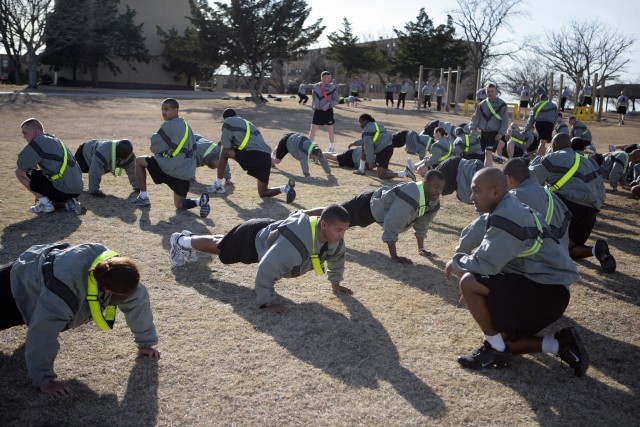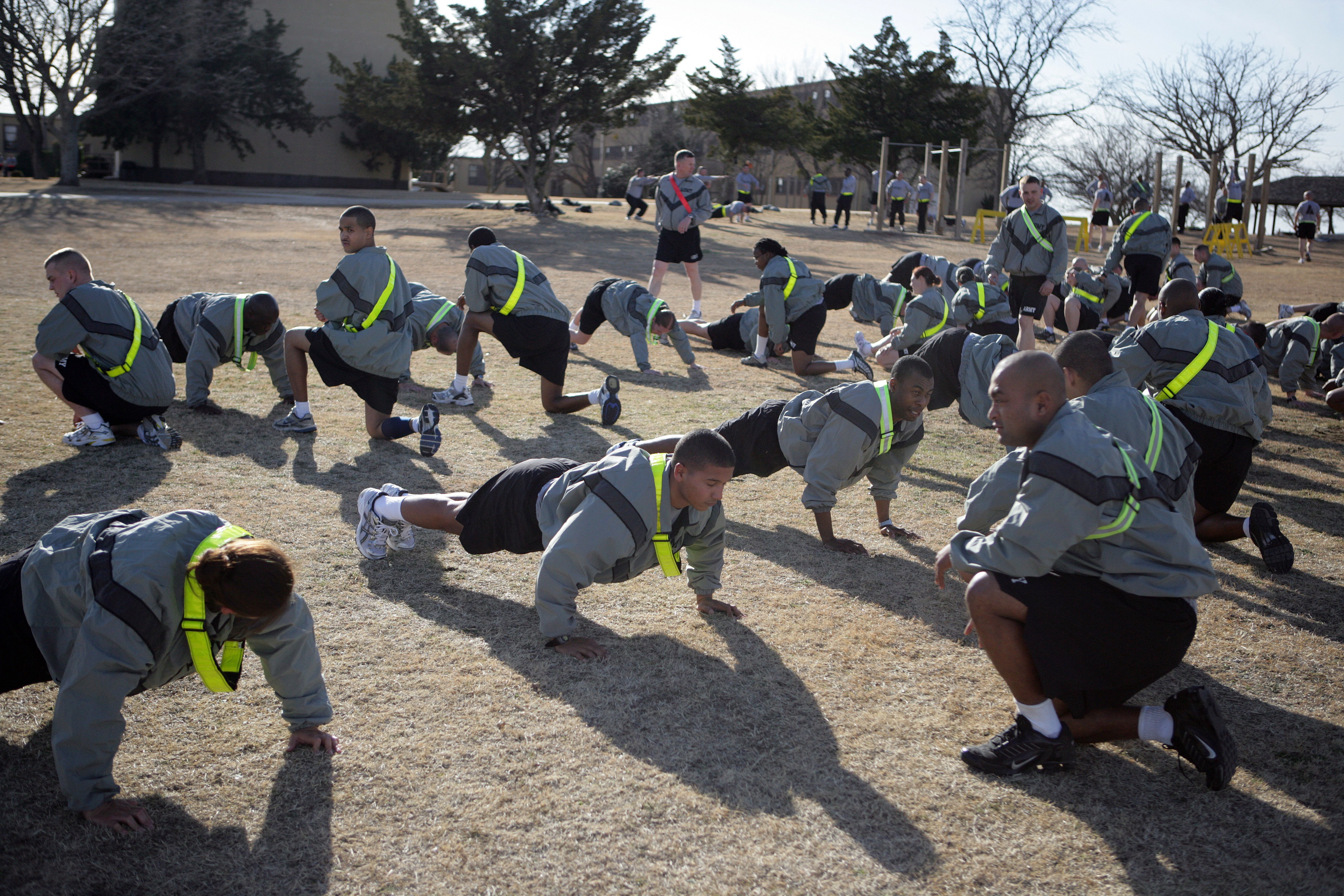
FORT SILL, OKla.--While most units on Fort Sill are still trudging out of bed before the break of dawn to hammer out pushups and run a few miles, the 75th Fires Brigade is sleeping in and leaving their exercise to the afternoon.
But before you write them off as shammers, there is a very scientific reason for the change.
"If you talk to a lot of Soldiers, they think that we did it for weather, but we didn't and I would have been laughed at if I proposed that," said Maj. Marc Hultquist, 75th FiB surgeon, who researched reasons why moving physical training would be beneficial to Soldiers.
"The reason we switched over was the Army is trying to rebuild or build resiliency in Soldiers who have been deployed and that also includes family members," said Col. Joseph Harrington, 75th FiB commander, who fully agreed with the plan.
The wear and tear on Soldiers is evident and commanders are trying to help Soldiers ease back into a normal routine after returning from deployments. In this experimental schedule, Soldiers in the brigade report to work at 8 a.m., put in their duty day then gather for physical training around 3:30 p.m. before going home. This has been the schedule since Oct. 5.
Hultquist came up with the idea after attending a meeting at the Military Child and Adolescent Center of Excellence. There, the topic was the difficulties young families are having surviving military life and the current operation tempo.
"When you think about the families and what they're going through, the spouse may be deployed and that causes disruption in the family. Then, they come back and if that Soldier has anxiety, post traumatic stress disorder, depression the whole family experiences that."
According to sleep studies commissioned by Army Medical Command, in 2002, roughly 19,000 Soldiers received 30,000 prescriptions for sleep medications. In 2008, that number jumped to 135,000 Soldiers getting 250,000 prescriptions.
So it dawned on Hultquist that to ease the effects of deployments on the families you have to first help the Soldier get more sleep.
"Soldiers that come in and they don't sleep have problems getting back into a normal routine and then we give them sleep medicine, but yet they have to get up at 4:30 in the morning the next day. It would be easy to say go to sleep earlier but when you have family and you have children to put to bed and they have homework that keeps them up until 9 or 9:30 p.m.," Hultquist said. "Or you're a single Soldier trying to do school and have professional development, you go to night classes, etc. So the thought process was that if we just switch the PT and had a later workday formation, then we could get potentially 90 minutes more sleep which, for most people, would complete a natural sleep cycle."
It may appear the Soldiers in the Diamond Brigade are lab rats in a science experiment, but that's not the case. Hultquist said it's more of a process improvement that could have serious benefits for Soldiers and their families.
"A mental illness can affect your sleep. So depression can make sleep worse, but sleep can make and lead to depression and make some of those symptoms worse. So there's a certain percentage of Soldiers that if we just fix their sleep a lot of those problems will just go away. They'll be able to handle a little more stress, they'll have more patience and tolerance and not get as snippy and agitated with their co-workers and their spouses."
With such a drastic change of an Army tradition, people want to see results, which so far have been very positive. Before the switch, the brigade took a survey. Nine percent of Soldiers surveyed reported two to four hours of sleep on a regular workday, 30 percent reported four to five hours and only 5 percent were getting seven hours or more of sleep a night.
After two months on the new schedule another survey was taken that showed the number of Soldiers who reported two to four hours and four to five hours was almost cut in half. Meanwhile, those who said they slept seven or more hours more than tripled.
The Soldiers' responses have also been mostly positive. The younger Soldiers prefer the later PT while the older ones are split about 50/50 with more slightly for it than not.
"I like it. I'm actually awake when I'm doing it. Most of the time I'm pretty groggy in the mornings so about halfway through it I'll be awake. I don't know why they switched it, but it works for me," said Sgt. Jason Coleman, 75th FiB Headquarters, Headquarters Battery.
"There are pros and cons to anything that you do. The pros are that Soldiers do get a little more sleep and the cons are you have to adjust your daily schedule to adjust for the change in PT as far as what you eat and drink during the day, so you're ready to actually do PT," said Capt. Aaron Thomas, Headquarters, Headquarters Battery, 1st Battalion, 17th Field Artillery.
"When I do hear people don't like it and I have the opportunity to explain why we did it, they seem to be a lot more empathetic and understanding of the project. So they still might not like it but they understand the views and the purpose of trying it," said Hultquist.
Harrington said it also allows them to work more effectively.
"What this does is force time management. You get a big block of time from 8 a.m. to noon and that's, according to every study, when you're freshest. You're more likely to learn, more likely to grow, mature and comprehend things."
The other upside, Harrington said, is less driving on and off post. And, Soldiers can work off the stress of the day in afternoon PT and go home more relaxed.
The brigade is switching back to the traditional PT schedule in April. This time the reason is the weather. Summer time temperatures in Oklahoma can create more problems than necessary and at that point, Hultquist said, it becomes more of a safety issue than sleep deprivation.
The 214th Fires Brigade also participated in the switch. They started just before Christmas and will have experienced about 90 days of the schedule before they change back.

Social Sharing